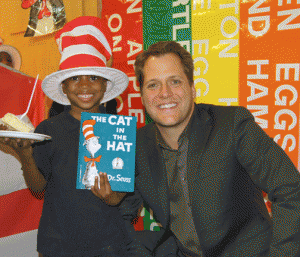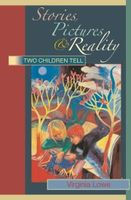My son, Alex, will be starting kindergarten this coming September, and I find myself thinking back to what I did to help those four and five year old emergent writers. With rising expectations for what incoming kindergarteners can do, I've been dusting off my kindergarten bag of tricks to work with Alex, to help him feel confident and ready when school starts. ![]()
Viewing: Blog Posts Tagged with: early childhood, Most Recent at Top [Help]
Results 1 - 25 of 32
Blog: TWO WRITING TEACHERS (Login to Add to MyJacketFlap)
JacketFlap tags: writing workshop, preschool, early childhood, Add a tag
Blog: TWO WRITING TEACHERS (Login to Add to MyJacketFlap)
JacketFlap tags: writing workshop, preschool, early childhood, Add a tag
My son, Alex, will be starting kindergarten this coming September, and I find myself thinking back to what I did to help those four and five year old emergent writers. With rising expectations for what incoming kindergarteners can do, I've been dusting off my kindergarten bag of tricks to work with Alex, to help him feel confident and ready when school starts. ![]()
Blog: TWO WRITING TEACHERS (Login to Add to MyJacketFlap)
JacketFlap tags: preschool, early childhood, Matt Glover, Add a tag
Last week, I encouraged a group of preschoolers to write books about their experiences. It went better than I expected.![]()
Blog: TWO WRITING TEACHERS (Login to Add to MyJacketFlap)
JacketFlap tags: Matt Glover, preschool, early childhood, Add a tag
Last week, I encouraged a group of preschoolers to write books about their experiences. It went better than I expected.![]()
Blog: TWO WRITING TEACHERS (Login to Add to MyJacketFlap)
JacketFlap tags: preschool, early childhood, Matt Glover, Add a tag
Last week, I encouraged a group of preschoolers to write books about their experiences. It went better than I expected.![]()
Blog: TWO WRITING TEACHERS (Login to Add to MyJacketFlap)
JacketFlap tags: biography, authors, thankful, reflections, writing workshop, lucy calkins, primary grades, aimee buckner, Lester L. Laminack, early childhood, katie wood ray, colleen cruz, shared writing, Day by Day, LIWP, Add a tag
What are the books that have shaped you as a teacher of writing? Reflecting today, in thanks, for the authors and books that have influenced my life as a teacher. ![]()
Blog: TWO WRITING TEACHERS (Login to Add to MyJacketFlap)
JacketFlap tags: writing workshop, preschool, early childhood, Throwback Week, Add a tag
Betsy Hubbard wrote a series of posts on writing in preschool last year. Her preschool series was not only informative about the ways to teach writing to three- and four-year-olds, but it conveyed a deep and genuine respect for our youngest learners. Let's take a look back at what Betsy had to say about these emerging writers.![]()
Blog: Perpetually Adolescent (Login to Add to MyJacketFlap)
JacketFlap tags: Book News, Picture Books, Notables, Early Childhood, Younger readers, Older readers, Book Reviews - Childrens and Young Adult, Joy Lawn, CBCA Short List, Eve pownall Information books, Add a tag
This year’s Children’s Book Council of Australia short list is a cracker. Older Readers I’ve reviewed most of the Older Reader titles for the Weekend Australian, which means that I think they’re excellent. It’s a superlative list this year. Incidentally, most of these authors are relatively or brand-new published YA writers; and are women, representing […]
Add a CommentBlog: TWO WRITING TEACHERS (Login to Add to MyJacketFlap)
JacketFlap tags: early childhood, Add a tag
When students first begin writing their stories they are oral and planned drawings. Eventually, however, letters and words begin to emerge on the page. How do we instruct this change? It first begins with… Continue reading ![]()
Blog: TWO WRITING TEACHERS (Login to Add to MyJacketFlap)
JacketFlap tags: early childhood, Add a tag
When students first begin writing their stories they are oral and planned drawings. Eventually, however, letters and words begin to emerge on the page. How do we instruct this change? It first begins with… Continue reading ![]()
Blog: TWO WRITING TEACHERS (Login to Add to MyJacketFlap)
JacketFlap tags: writing workshop, young authors, early childhood, peer conferring, Martha Horn, Add a tag
Blog: TWO WRITING TEACHERS (Login to Add to MyJacketFlap)
JacketFlap tags: Q & A, series, writing workshop, early childhood, Add a tag
Before this series of posts on preschool writers began, I asked you to tell me what burning questions you had. Get ready for a Q&A!![]()
Blog: TWO WRITING TEACHERS (Login to Add to MyJacketFlap)
JacketFlap tags: goals, writing workshop, early childhood, sequence, Add a tag
Writing is a big animal. A subjective animal as well when it comes to teaching our youngest writers.![]()
Blog: TWO WRITING TEACHERS (Login to Add to MyJacketFlap)
JacketFlap tags: writing workshop, early childhood, katie wood ray, Add a tag
"People who are comfortable composing are much more likely to have strong identities as writers than people who don't." Katie Wood Ray & Matt Glover![]()
Blog: TWO WRITING TEACHERS (Login to Add to MyJacketFlap)
JacketFlap tags: writing workshop, early childhood, Add a tag
What is your writing routine? Find some advice and tools to assist you in developing a routine that works for you and your students. ![]()
Blog: TWO WRITING TEACHERS (Login to Add to MyJacketFlap)
JacketFlap tags: writing workshop, early childhood, Add a tag
What is your writing routine? Find some advice and tools to assist you in developing a routine that works for you and your students. ![]()
Blog: TWO WRITING TEACHERS (Login to Add to MyJacketFlap)
JacketFlap tags: early childhood, monitoring student learning, Add a tag
Demonstrating that print carries a message is the first and most important step when taking a writer from talking and drawing to writing words. ![]()
Blog: TWO WRITING TEACHERS (Login to Add to MyJacketFlap)
JacketFlap tags: writing workshop, early childhood, monitoring student learning, Add a tag
What chair are you sitting in when it comes to conferring? Is it too hard, too soft or just right? Read on to find common questions and tips when sitting beside the youngest writers. ![]()
Blog: TWO WRITING TEACHERS (Login to Add to MyJacketFlap)
JacketFlap tags: monitoring student learning, prompting and support, writing workshop, early childhood, Add a tag
Prompting and support can be tricky business. Here are some tips for early writers who have moved from the verbal story and are ready to draw. These suggestions will help you support the right things at the right time in the right way.![]()
Blog: TWO WRITING TEACHERS (Login to Add to MyJacketFlap)
JacketFlap tags: writing workshop, early childhood, Add a tag
Blog: TWO WRITING TEACHERS (Login to Add to MyJacketFlap)
JacketFlap tags: writing workshop, early childhood, Add a tag
Blog: TWO WRITING TEACHERS (Login to Add to MyJacketFlap)
JacketFlap tags: writing workshop, early childhood, Add a tag
Blog: First Book (Login to Add to MyJacketFlap)
JacketFlap tags: reading, Literacy, Dr. Seuss, Books & Reading, Education, Authors & Illustrators, teachers, First Book, Read Across America, The Cat in the Hat, early childhood, NEA, National Education Association, Newark, First Book Partners, #bookstokids, Add a tag

Chandler Arnold, First Book’s executive vice-president, with a student from Belmont Runyon Elementary school in Newark, NJ, at a ‘Read Across America’ event last year.
Read Across America Day is fast approaching; on March 1, children across the country will celebrate Dr. Seuss’s birthday by reading ‘The Cat in the Hat’ and other childhood favorites.
But, as much as we love Dr. Seuss, the READING part is the important bit. At First Book, we will always line up for cake and ice cream, but books and reading come first. Because kids who read at home become stronger, more capable readers, and that’s the critical ingredient in become successful — in school and in life.
‘Read Across America’ is an annual event sponsored by our friends at the National Education Association (NEA). First Book is proud to do our part for such a critical issue.
Here’s what you can do:
- If you work with kids from low-income families, sign your program or classroom up with First Book. We can help you get new, high-quality books, including (naturally) ‘The Cat in the Hat’ and other Dr. Seuss favorites.
- If your program is already signed up with First Book, visit the First Book Marketplace to get some great Dr. Seuss titles for your kids.
- Take the NEA’s ‘Read Across America’ pledge.
And most importantly of all, take the time to read to a child in your life. You’ll both be glad you did.
Blog: Jrpoulter's Weblog (Login to Add to MyJacketFlap)
JacketFlap tags: early childhood, primary school, child psychology, early learning, Ripple Reader, quality time, Dr. Virginia Lowe, remedial teaching, children's books, reading, family, Uncategorized, literacy, picture books, children's literature, bedtime, Stories, illustrated books, grandparents, bonding, Add a tag
Reading – we all recognise it as a core skill. By ‘intelligent reading’, I mean reading with a level of comprehension commensurate with the child’s experience of the world they inhabit. Fortunately, reading to children is now encouraged as being supportive of reading literacy and as a sound foundation for future learning.
Not that long ago, children were seen as passive recipients of the eager parent’s input via the quality time spent in ‘read to me’ and ‘bedtime story’ sessions.
I always felt sure my children were taking in much more than the professional opinion allowed.
Recently, I borrowed a copy of Dr. Virginia Lowe’s very excellent book, “Stories, Pictures and Reality: Two children tell” (Routlege 2007) based on the record of her own two children’s responses to books from birth to adolescence. Dr. Lowe’s book vindicates what I felt all along as a parent! This book should be set reading for students of primary, early childhood and remedial teaching, child and family psychology and for anyone with an interest in literacy!
Her children had a smorgasbord of stories proffered continuously, both Dr Lowe and her husband being librarians who were passionate advocates of children’s literature. The children’s reactions to and responses concerning elements of story and illustrations provide a wonderfully insightful peek into the psyche of the child. Both Lowe children clearly had a blessed and privileged childhood, but being ‘read to’ is within the reach of most children. Public libraries and school libraries are accessible to most families. Even if parental work commitments make a nightly ‘reading’ impossible, there are weekends and visits to grandparents when a ‘storytelling’ session can be included in the agenda.
There are other options.
Storytelling sessions are held regularly in many public libraries and are ‘free’.
And online resources such as “Ripple Reader” and “A Story Before Bed” provide a way for even absent grandparents and parents to read to their children. In the USA and Israel, ‘bedtime stories’ are part of official early education policy. Programmes like “Reach Out and Read” and “Read to Me” do a monumental job in promoting literacy and the power of storytime to be a deeply meaningful and bonding time in families.
Blog: TWO WRITING TEACHERS (Login to Add to MyJacketFlap)
JacketFlap tags: stereotypes, play, primary grades, early childhood, boys and girls, Peggy Orenstein, cooperative learning opportunities, Add a tag
I recently read Cinderella Ate My Daughter: Dispatches from the Front Lines of the New Girlie-Girl Culture (2011) by Peggy Orenstein. While hospitals don’t hand out manuals to parents who leave with a… Read More ![]()
View Next 6 Posts


